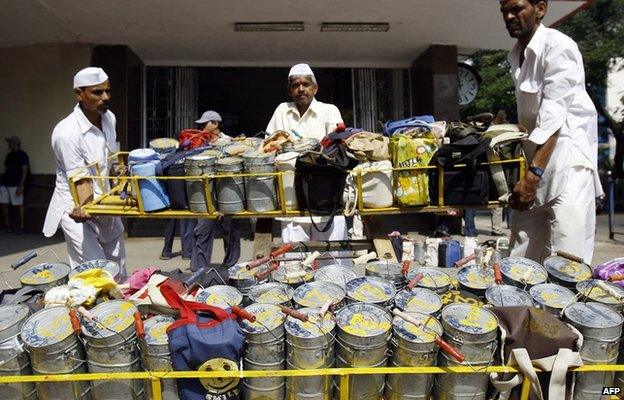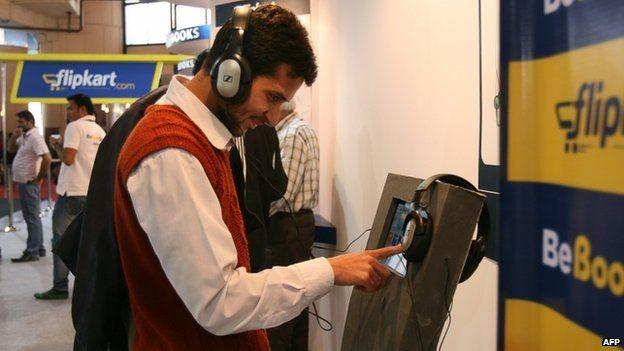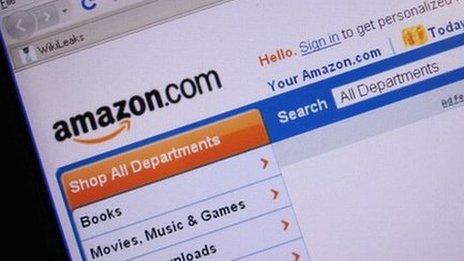Flipkart: India retailer in lunchbox delivery deal
- Published

Dabbawalas' efficient delivery system has been widely praised
India's biggest online retailer Flipkart has teamed up with Mumbai's famous lunchbox delivery men to help them get parcels to customers.
Dabbawalas collect packed hot lunches from customer's homes and carry them to offices and schools across the city.
Flipkart hopes using this expertise will make "last mile" distribution of packages more efficient.
Online retail has boomed in India and is forecast to be worth $16bn (£10bn) by 2018.
Dabbawalas are a familiar sight around Mumbai's often cramped streets - using heavily loaded bicycles to deliver about 200,000 "tiffin" or packed lunch boxes every day.
For decades they have been using a complex coding system - using colours, numbers, letters and symbols - which has been lauded by researchers at Harvard University and recognised with the Six Sigma level of accuracy, meaning they make only one mistake in six million deliveries.
'Trusted brands'
"The dabbawalas of Mumbai are one of the most reliable and trusted brands in the city. Their unique delivery system has been smooth, reliable and has survived the test of time - even under extreme conditions," said Neeraj Aggarwal, Flipkart's senior director for last mile delivery.
Dabbawalas will be assigned deliveries from a Flipkart hub while collecting meals from customers' homes.
And while for now they are using a paper-based tracking system, there are plans to move on to apps and wearable technology.
Like other online retailers, Flipkart allows customers the option to pay cash on delivery of purchase, but initially dabbawalas will only be used for pre-paid orders.

Flipkart is India's biggest online retailer
The deal is part of the e-commerce firm's efforts to explore new ways of making deliveries.
It recently began a trial in Bangalore using a crowd-sourced delivery option on low value items - to connect local sellers and buyers with the help of voluntary delivery personnel.
Launched in 2007, Flipkart now has 30 million registered users and has attracted billions of dollars of investment as it tries to dominate the sector.
US retailer Amazon has invested about $2bn into its Indian operations while homegrown firm Snapdeal is another rival in this fast-growing industry.
All three operate as marketplaces - rather than as direct sellers - because Indian law does not allow foreign direct investment in e-commerce sites that sell directly to customers.
And the three businesses currently run at a heavy loss, subsidising the cost of products to offer extensive discounts as they try to tempt more shoppers online.
Unlike in the US and Europe, the vast majority of Indian customers buy items using mobile phones rather than desktop computers - the country sees about 40 million new phone subscriptions every year - with a rapid growth in the uptake of smartphones as more affordable models come on to the market.
The BBC understands that one of the country's other online retailers - fashion brand Myntra which is owned by Flipkart - will shut its website completely in the next few weeks and operate as a mobile-only business.
- Published16 February 2014
- Published8 October 2010
- Published14 August 2014
